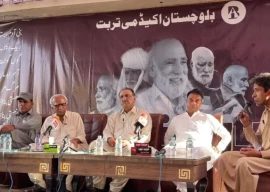
Pressed in the Supreme Court on the weekly review of oil prices, the ministry of petroleum has passed the buck to the Economic Coordination Committee (ECC) to make a decision on the matter.
“[The] ECC will take a decision on whether the oil prices should be determined on a weekly, fortnightly or monthly basis,” Adviser to the Prime Minister on Petroleum and Natural Resources Dr Asim Hussain told journalists during a visit to the Oil and Gas Training Institute (OGTI) of the Oil and Gas Development Company Limited on Monday.
Sources told The Express Tribune that, in a summary sent to the ECC on Monday, the ministry of petroleum had not proposed reverting back to the monthly price review of oil, following Supreme Court, but rather informed the economic body about the recommendations of a parliamentary panel calling for the replacement of the weekly assessment mechanism with a monthly one.
Sources added that, if anything, the two-page summary stated all the benefits of the current oil prices review, and the ECC was asked to take a decision on determining the oil prices on either a weekly, fortnightly or monthly basis.
The ministry of finance and the Oil and Gas Regulatory Authority (Ogra) had already opposed the price determination on a weekly basis when the summary was tabled before the ECC for its approval, but their concerns were not addressed. Ogra was of the view that the current price review was being exploited by refineries, oil marketing companies and hoarders. It also argued that the government should freeze oil prices for three months to provide relief to the consumers.
Speaking to journalists, Dr Hussain argued that the government had provided relief to consumers by reducing the Petroleum Levy (PL) rate on petroleum products. “The government gave a subsidy of Rs51 billion in 2011 by cutting the rate of the petroleum levy.”
Action against CNG stations
Adviser to the Prime Minister on Petroleum and Natural Resources Dr Asim Hussain also welcomed the Supreme Court’s decision on declaring “illegal” the existing formula of linking the review of CNG prices with oil prices. He said that CNG fuel should continue to be used in public transport. He said that Ogra’s role was important but it could not monitor everything.
Regarding the unwillingness of CNG stations to revert to the new prices, slashed by over Rs30, he added that gas supply to five stations was disconnected for not abiding by Ogra’s notification.
Dr Hussain claimed that provincial governments were also sealing other CNG stations that were not following the decision. He also suspended the chief engineer of the Sui Northern Gas Pipeline Limited during a visit to its office over complaints of overbilling. He also directed it to take action against CNG stations that were not selling gas to consumers.
During a visit to the OGTI, Dr Hussain said that the capacity building of professionals in the oil and gas sector needed to be enhanced and the abilities of young talent should also be harnessed.
He informed that the OGTI was providing training to new workers of the OGDCL.
The government gave a subsidy of Rs51 billion in 2011 by cutting the rate of the petroleum levy Adviser to the Prime Minister on Petroleum and Natural Resources, Dr Asim Hussain.
Published in The Express Tribune, November 6th, 2012.
COMMENTS (1)
Comments are moderated and generally will be posted if they are on-topic and not abusive.
For more information, please see our Comments FAQ





1732427746-0/Copy-of-Untitled-(2)1732427746-0-270x192.webp)











plz take alook on diesel prices as compare to our neighbour country beacause diesel price directly hit on rise of inflation